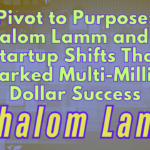In today’s high-speed, always-connected world, stress has become a familiar companion for many professionals. But for entrepreneurs—those who juggle leadership, innovation, financial pressure, and personal sacrifices—stress can become a constant undercurrent. Managing it is not just about staying sane; it’s about staying effective.
Shalom Lamm, a seasoned entrepreneur and CEO of Operation Benjamin, understands this reality well. Having led ventures across the real estate, logistics, and nonprofit sectors, Lamm has built a career around mission-driven leadership and calm execution—even in the face of immense responsibility and emotional challenges.
His work with Operation Benjamin—a nonprofit that locates and corrects the headstones of Jewish-American soldiers mistakenly buried under non-Jewish symbols—requires navigating government bureaucracy, historical research, and deeply personal family dynamics. It’s high-stakes, emotionally charged, and, at times, deeply stressful.
And yet, those who work with Lamm often describe him as grounded, focused, and calm under pressure. So, how does he do it? This article explores how Shalom Lamm manages stress, the habits he’s developed, and the mindset shifts that help him lead with clarity and purpose, even in turbulent times.
The Nature of Entrepreneurial Stress
Before diving into strategies, it’s worth exploring why entrepreneurship in particular is such fertile ground for stress:
- Uncertainty – Every decision feels like it could make or break the business.
- Responsibility – Leaders are accountable not just to themselves, but to employees, customers, partners, and in Lamm’s case, the legacy of fallen soldiers and their families.
- Isolation – Entrepreneurs often feel they must carry the emotional weight alone.
- No clear off switch – The work is always evolving, and boundaries blur.
“As a leader, you have to be okay with not having all the answers,” says Lamm. “Stress comes when we try to control everything. Peace comes when we learn to manage what we can, and trust the rest.”
1. Purpose as an Anchor
Perhaps the most important tool Shalom Lamm uses to manage stress is purpose. For him, staying aligned with a mission—whether in business or nonprofit work—is the ultimate antidote to burnout.
At Operation Benjamin, the emotional weight is immense. The team is working to restore the dignity of soldiers who gave their lives for freedom, and to bring closure to families who have carried that legacy for generations.
That responsibility could be overwhelming, but Lamm reframes it as meaningful work.
“When your work has purpose, the stress you feel becomes fuel, not just pressure,” he says. “You’re not just running a business—you’re part of something that matters.”
This mindset helps him transform stress into motivation.
2. Structured Routines Create Stability
Lamm is a strong believer in creating daily structure, especially in the face of unpredictable challenges. Having a set rhythm gives the mind something steady to rely on.
His day often begins with:
- A brief period of morning quiet (meditation or reflection)
- Exercise (even a brisk walk counts)
- Review of the day’s top three priorities
By starting with focus and movement, he avoids the reactive spiral of emails and urgent messages. This grounding allows him to approach the day with greater clarity.
“If you start your day already in chaos, you’re training your mind to operate in stress mode. Structure is a kind of stress vaccine,” says Lamm.
3. Healthy Boundaries for Long-Term Resilience
One of the most common mistakes entrepreneurs make, Lamm notes, is believing they must always be “on.” That mindset might deliver short-term results, but long-term, it’s a recipe for exhaustion.
Lamm protects his time and energy with firm boundaries:
- Designated “no work” hours in the evening
- Time blocked for family and personal activities
- Intentional time away from screens, especially on weekends
He also encourages his teams at Operation Benjamin to adopt similar habits.
“You don’t win by grinding 24/7. You win by being present, sharp, and rested when it matters most.”
4. Delegation and Trust
A major source of entrepreneurial stress comes from trying to control everything. Lamm learned early in his career that scalable leadership requires delegation and trust.
At Operation Benjamin, he has built a capable team of researchers, historians, military liaisons, and administrators. Rather than micromanaging, he empowers them with the autonomy to make decisions—while remaining available for strategic input.
This reduces stress for him and fosters leadership in others.
“Stress multiplies when you don’t trust your people. If you’ve hired well, let them lead,” he advises.
5. Mindfulness and Emotional Regulation
Though Lamm doesn’t present himself as a “guru,” he values mindfulness as a daily practice. Whether it’s a few minutes of deep breathing, silent reflection, or simply checking in with his emotional state, he uses these moments to center himself.
When Operation Benjamin is navigating emotionally sensitive situations—such as communicating with the family of a fallen soldier—this kind of inner clarity is crucial.
“The work we do is sacred. Emotions run high. I have to be calm in the storm,” Lamm explains.
He also brings this grounded presence into board meetings, planning sessions, and strategic discussions—modeling emotional stability for others.
6. Perspective: The Long View
Perhaps one of Lamm’s most underrated stress management tools is perspective. Having worked in multiple industries and seen projects rise, fall, and evolve, he maintains a long-term view of success and setbacks.
When a project hits a roadblock, or a negotiation stalls, he reminds himself—and his team—that progress often comes in waves.
“Not every day has to be a win. What matters is consistency, purpose, and resilience over time.”
This shift in mindset lowers the stakes of day-to-day turbulence and prevents unnecessary panic.
Operation Benjamin: A Case Study in Meaningful Leadership
Working at the helm of a nonprofit like Operation Benjamin is deeply fulfilling—but also emotionally intense. The organization’s mission touches history, identity, and grief. Mistakes aren’t just logistical—they’re personal.
Lamm’s leadership has helped the organization grow responsibly, with reverence for its mission and steadiness under pressure. Through it all, stress is managed not through brute force, but through perspective, process, and people.
Final Thoughts: Redefining Stress as a Signal
Stress, for Shalom Lamm, is not a weakness to hide or a hurdle to power through. It’s a signal—a sign that something needs attention, rethinking, or support. By responding to that signal with intention, rather than impulse, he’s built a career—and a legacy—rooted in both impact and sustainability.
Whether you’re leading a business, a nonprofit, or your own team, the takeaways are clear:
- Anchor your work in purpose
- Build structure into your days
- Set boundaries without guilt
- Delegate and trust
- Stay emotionally grounded
- Zoom out for perspective
“You don’t eliminate stress—you learn to meet it with wisdom,” says Lamm.
And in doing so, you become not just a better leader—but a stronger, steadier version of yourself.





